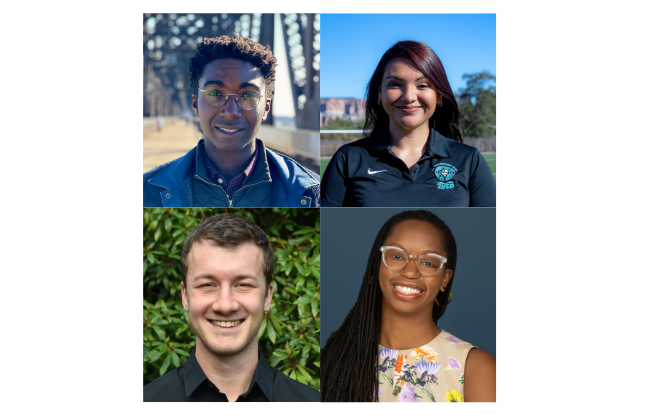Adolescent Portfolio Partners Drive Change Inspired by Their Own Journeys
Partners reveal how formative civic experiences energize their work with young changemakers today

As young people move into greater autonomy and emerge as changemakers during adolescence, they often look for mentors to light a path they can follow on their own leadership paths. We asked leaders from our adolescent-focused grantmaking portfolio, including the Kentucky Student Voice Team, Zuni Youth Enrichment Project, Rhizome, and Generation Citizen, to share how their adolescent experiences motivated them to lead organizations serving young people today.
Below, these partners, working in focus areas including digital and media and art, Native youth leadership, and community-based civics, offer encouragement to the next generation of changemakers.

L to R: Andrew Brennen, Tahlia Natachu-Eriacho, Jacob Merkle, Elizabeth Clay Roy
Andrew E. Brennen | Co-Founder & Board Chair, Kentucky Student Voice Team (KSVT)
How would you define a youth changemaker, and how does the mission of KSVT support young people in their leadership journey? To me, being a changemaker means acting even when it’s hard or uncomfortable. It means listening to unheard voices, asking better questions, and working together to build something more just. Youth bring urgency, clarity, and deep personal experience. Through KSVT, we help young people engage in research, advocacy, and civic leadership—equipping them to be full partners in shaping the systems that affect their lives.
Is there someone in your life or story you would consider a changemaker? A peer or mentor, perhaps? One of my biggest inspirations was my friend Henry. He was courageous and kind and testified against anti-LGBTQ legislation when we were in high school. His bravery stayed with me, and after his passing, it became even clearer to me why this work matters.
Can you speak a word of encouragement to young people or educators who want to make change but feel overwhelmed or unsure where to start? Start small. I co-founded KSVT because school often didn’t serve students like us. We were smart, curious, and from diverse backgrounds, but our needs weren’t being met. We turned that frustration into action—and I’ve stayed on that path ever since. Start with a question that matters to you. Find someone who shares your concern. You don’t need to be an expert or have all the answers. Just care enough to notice, and brave enough to act.
Tahlia Natachu-Eriacho | Executive Director, Zuni Youth Enrichment Project (ZYEP)
What does changemaking look like in everyday life? A changemaker is genuine, selfless, and rooted in their community. They recognize what’s missing and work to uplift others, not just for now, but for future generations. Youth specifically bring fresh perspectives and long-term investment. ZYEP supports them by creating space to lead and grow, ensuring that cultural strength and wellness guide their work.
Tell me a little about how a changemaker inspired you in your story. I’ve been surrounded by incredible women—mothers, teachers, and mentors—who led with values and care. They taught me what community means, not just in words but through action. I didn’t expect to become an executive director, but I’m not surprised I’m with ZYEP—they helped raise me. When I had the chance to give back, I knew I had to.
What wisdom would you share with a young person or educator who wants to begin to create change more intentionally?
The idea of being a ‘changemaker’ can sound overwhelming—but real impact happens in small, everyday actions. Care for yourself as you care for others. That’s where change begins.
Jacob Merkle | Co-CEO, Rhizome
Are there any changemakers from the past who have inspired you personally or professionally? Reverend James Lawson deeply influenced me. He was calm, intentional, and full of moral clarity. Even in his later years, he inspired young people with his commitment to justice and nonviolence. His legacy reminds me to stay grounded in my values.
Can you tell me a bit about the journey towards your current role? Would it have surprised you growing up if you knew you would be doing the work you do? I never thought I’d be a Co-CEO, let alone co-lead an organization started with 90 young people across the country. But I believed in what we were trying to build—something sustainable, youth-centered, and radically different. That belief made the risk worth it.
Do you have any advice for young people or educators who feel called to make a difference but are unclear about what steps to take first?
Change doesn’t happen in isolation. Find your people. Focus on doing good work with integrity. As Ella Baker said, “People have to be made to understand that they can't look for salvation anywhere but themselves.”
Elizabeth Clay Roy | CEO, Generation Citizen
What does it mean to you to be a changemaker? Being a changemaker means responding to fear and despair with action and connection. I first experienced this as a teen, when I started volunteering. Despite being nervous about public speaking, I realized the impact I wanted to make mattered more. It was empowering.
Why are youth changemakers important right now? How does your Generation Citizen’s mission or work support that? Young people are facing a crisis of trust and belonging. Despite being the most informed and diverse generation, many feel disconnected from civic life. At Generation Citizen, we support youth by providing real-world, project-based civics education that helps them build civic skills, knowledge, and the confidence to lead. We’re helping students move from passive observers to active participants in democracy.
For those who want to step into changemaking but feel uncertain or daunted—what words of encouragement would you offer? Your voice and ideas are exactly what our communities and democracy need. Don’t be discouraged by the scale of the challenges—we all start with a single step. Focus on what matters most to you, right where you are. You don’t need permission to begin. You are already powerful.